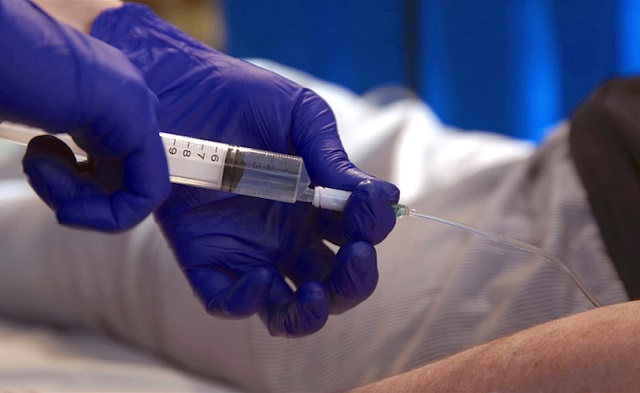MAiD
Saskatchewan euthanasia deaths jumped over 30% from 2022 to 2023: data

From LifeSiteNews
The Saskatchewan Health Authority reported to the Euthanasia Prevention Coalition that there were 344 assisted deaths in 2023, up from 257 in 2022, representing an increase of over 30 percent in just one year.
The Euthanasia Prevention Coalition is wondering why Canada’s province of Saskatchewan had a greater than 25 percent increase in euthanasia deaths in 2023.
The Saskatchewan Health Authority reported to the Euthanasia Prevention Coalition that there were 344 assisted deaths in 2023, up from 257 in 2022, which represents a 33 percent increase in just one year.

On July 8, 2024, we published an article estimating that there were approximately 15,280 euthanasia deaths nationwide in 2023, a 15.4% increase based on data from Ontario, Quebec, British Columbia, Manitoba, Alberta and Nova Scotia.

Here is how the numbers add up:
The B.C. Medical Assistance in Dying 2023 report stated that there were 2,767 reported assisted deaths, up 10 percent from the 2,515 in 2022.
CBC Radio Canada published an article on March 9, 2024 stating that in 2023 in Quebec there were 5,686 reported deaths, representing 7.3 percent of all deaths in the province and a 17 percent increase from 2022. This represents the highest euthanasia rate in the world. The Radio Canada report was based on the Quebec euthanasia deaths between January 1 – December 31, 2023.
The Office of the Chief Coroner of Ontario released the December 2023 “Medical Assistance in Dying” (MAiD) data indicating that there were 4,641 reported euthanasia deaths in 2023, a 18 percent increase from the 3,934 reported euthanasia deaths in 2022.
The Alberta Health Services reports that there were 977 reported assisted deaths in 2023, which was up by more than 18 percent from the 836 reported assisted deaths in 2022.
The Nova Scotia Medical Assistance in Dying data indicates that there were 342 reported assisted deaths in 2023 which was up by more than 25 percent from 272 in 2022.
An article published by Global News, which may only be preliminary data, indicated that there were 236 reported Manitoba assisted deaths in 2023, which was up by 6 percent from 223 in 2022.
According to the data from Ontario, Quebec, Alberta, Nova Scotia, Manitoba, British Columbia and Saskatchewan, there were 14,757 assisted deaths in 2023 (in those provinces), a 15.7 percent from the 12,747 assisted deaths in 2022 (in those provinces).
Since the total number of Canadian assisted deaths in 2022 was 13,241, we estimate that there were approximately 15,280 Canadian assisted deaths in 2023.
Reprinted with permission from Euthanasia Prevention Coalition.
MAiD
Study promotes liver transplants from Canadian euthanasia victims

From LifeSiteNews
A new study encourages transplants from euthanasia donors, saying that harvesting the organs of people killed by euthanasia has a ‘real impact’ on organ supply.
A concerning new study shows that liver transplants from euthanasia donors yield similar results as those from other donations, a finding that could increase pressure to euthanize vulnerable Canadians.
On October 26, the Journal of Hepatology published research comparing liver transplants in Canada from donations after circulatory death – a problematic method of organ donation – and from donations of those who were euthanized, in the latest study into increasing organ transplants from euthanasia or so-called “medical assistance in dying” (“MAID”) victims.
“Our study provides the first large-scale Canadian experience, paralleling previous studies from Belgium and the Netherlands, showing that outcomes are positive, while also demonstrating the real impact that MAiD donation can have on the availability of organs,” co-lead investigator A.M. James Shapiro declared.
“While not all individuals pursuing MAiD are suitable for donation for various reasons, we hope that our study will allow a better understanding of the potential role of organ donation following MAiD,” he continued.
Shapiro highlighted, in his view, “how impactful it can be for saving lives of many people in their final act of generosity.”
Canada is one of few countries, alongside Australia, Belgium, Spain, and the Netherlands, that harvests organs from euthanasia victims. Under the Liberal government, Canada has become the world leader in organ donations from people who obtained state-sanctioned euthanasia.
Recently, the interest in the practice has boomed, after the heart of a euthanized Canadian man was successfully harvested and donated to an American man with heart failure.
While many Canadians are left without necessary healthcare and even goaded to end their lives through euthanasia, the Liberal-run health system appears to prioritize the lucrative business of harvesting organs from Canadians killed off by their euthanasia regime.
According to some estimates, a heart is “worth around $1 million in the U.S. Livers come in second, about $557,000, and kidneys cost about $262,000 each. Not to speak about human skin ($10/inch), stomach ($500), and eyeballs ($1,500 each).”
Additionally, as LifeSiteNews has extensively covered, health officials have sounded the alarm over organs being harvested from still living patients in order to obtain fresh organs for transplants.
Similarly, conservative Irish think tank academic Dr. Angelo Bottone has warned against a push to harvest organs from euthanasia victims before they are killed.
“While donation after euthanasia is already happening in those countries, doctors are now discussing harvesting organs before euthanasia patients are declared dead, in order to preserve organ viability,” Bottone wrote.
“They propose that organs be removed under general anaesthesia before the patient is declared dead, thereby maintaining continuous blood circulation and oxygenation to the organs until the moment of retrieval,” the scholar continued. “This method could significantly improve the quality and quantity of organs available for transplantation.”
The most recent reports show that euthanasia is the sixth highest cause of death in Canada. However, it was not listed as such in Statistics Canada’s top 10 leading causes of death from 2019 to 2022.
Asked why euthanasia was left off the list, the agency said that it records the illnesses that led Canadians to choose to end their lives via euthanasia, not the actual cause of death, as the primary cause of death.
According to Health Canada, in 2022, 13,241 Canadians died by lethal euthanasia injections. This accounts for 4.1 percent of all deaths in the country for that year, a 31.2 percent increase from 2021.
MAiD
Disabled Canadians increasingly under pressure to opt for euthanasia during routine doctor visits

From LifeSiteNews
Inclusion Canada reported to Parliament that disabled Canadians feeling pressure to choose assisted suicide is a ‘weekly’ occurrence due to MAiD expansion to the non-terminally ill.
Inclusion Canada CEO Krista Carr revealed that many disabled Canadians are being pressured to end their lives with euthanasia during routine medical appointments.
During an October 8 session of the Parliamentary Finance Committee, Carr, an advocate against Medical Assistance in Dying (MAiD), explained that Canada’s expansion of MAiD to the non-terminally ill has led to people with disabilities being pressured to end their lives during unrelated medical visits.
“Since the bill was brought in around Track 2 MAID … that has certainly changed people’s interactions with the healthcare system,” she explained, referring to the 2021 expansion that allowed those who are chronically ill but not terminally ill to be euthanized.
“People with disabilities are now very much afraid in many circumstances to show up in the health care system with regular health concerns, because often MAID is suggested as a solution to what is considered to be intolerable suffering,” she revealed.
WOW
“People with disabilities are now very much afraid in many circumstances to show up in the healthcare system with regular concerns. Often MAID is suggested as a solution.
“Since the bill was brought in around Track 2 MAID…that has certainly changed people’s interactions… pic.twitter.com/kjsVk8UbAK
— Garnett Genuis (@GarnettGenuis) October 16, 2025
Conservative Member of Parliament Garnett Genuis questioned how often people with disabilities are encouraged to have themselves euthanatized. Carr responded that this is a “weekly” occurrence for Canadians living with disabilities.
Carr warned that Canadians living with disabilities are disproportionately targeted by the MAiD expansion because their medical conditions leave them vulnerable to the euthanasia mindset within hospitals. Additionally, according to Carr, “poverty” is considered “intolerable suffering,” making a person eligible to receive MAiD.
Carr’s statement supports internal documents from Ontario doctors in 2024 that revealed Canadians are choosing euthanasia because of poverty and loneliness, not as a result of a terminal illness.
In one case, an Ontario doctor revealed that a middle-aged worker, whose ankle and back injuries had left him unable to work, felt that the government’s insufficient support was “leaving (him) with no choice but to pursue MAiD.”
Other cases included an obese woman who described herself as a “useless body taking up space,” which one doctor argued met the requirements for MAiD because obesity is “a medical condition which is indeed grievous and irremediable.”
Overall, 116 of Ontario’s 4,528 euthanasia deaths in 2023 involved non-terminal patients, with many of those killed from impoverished communities.
Data from Ontario’s chief coroner for 2023 revealed that over three-quarters of those euthanized when death wasn’t imminent required disability support before their death.
Similarly, nearly 29% of those killed when they were not terminally ill lived in the poorest parts of Ontario, and only 20% of the province’s general population lives in those areas.
At the same time, the Liberal government has worked to expand MAiD 13-fold since it was legalized, making it the fastest growing euthanasia program in the world.
Currently, wait times to receive care in Canada have increased to an average of 27.7 weeks, leading some Canadians to despair and opt for euthanasia instead of waiting for assistance. At the same time, sick and elderly Canadians who have refused to end their lives via MAiD have reported being called “selfish” by their providers.
The most recent reports show that MAiD is the sixth highest cause of death in Canada. However, it was not listed as such in Statistics Canada’s top 10 leading causes of death from 2019 to 2022.
Asked why MAiD was left off the list, the agency said that it records the illnesses that led Canadians to choose to end their lives via euthanasia, not the actual cause of death, as the primary cause of death.
According to Health Canada, 13,241 Canadians died by MAiD lethal injections in 2022, accounting for 4.1 percent of all deaths in the country that year, a 31.2 percent increase from 2021.
-

 Energy2 days ago
Energy2 days agoEby should put up, shut up, or pay up
-

 Daily Caller2 days ago
Daily Caller2 days agoUS Eating Canada’s Lunch While Liberals Stall – Trump Admin Announces Record-Shattering Energy Report
-

 Business2 days ago
Business2 days agoThe Liberal budget is a massive FAILURE: Former Liberal Cabinet Member Dan McTeague
-

 COVID-192 days ago
COVID-192 days agoFreedom Convoy leader Tamara Lich to appeal her recent conviction
-

 Business2 days ago
Business2 days agoCarney’s budget spares tax status of Canadian churches, pro-life groups after backlash
-

 Justice2 days ago
Justice2 days agoCarney government lets Supreme Court decision stand despite outrage over child porn ruling
-

 espionage1 day ago
espionage1 day agoU.S. Charges Three More Chinese Scholars in Wuhan Bio-Smuggling Case, Citing Pattern of Foreign Exploitation in American Research Labs
-

 Business19 hours ago
Business19 hours agoCarney budget doubles down on Trudeau-era policies







